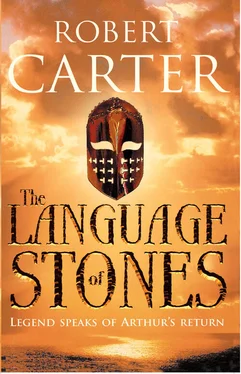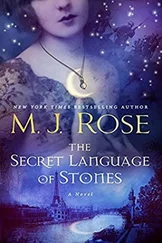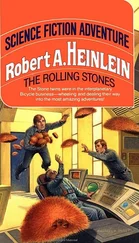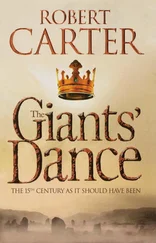‘War,’ he whispered, picking up a half-formed sword blade. ‘Just like Master Gwydion said…’
Excitement thrilled through him as he looked at what had been fashioned. There were blades of different lengths, all as yet without point or edge. Grim-looking axe-heads and war-hammers stood in rows. And thousands of sharpened arrowheads waited to be attached to shafts. In another shed were iron hats and helms, many roughly-made pieces of armour for limb and body. And in the shelter of a thatched lean-to was a mail-maker’s bench with boxes of rivets and pairs of pincers with rags tied round their handles. Thousands of close-linked rings had already been painstakingly fitted together to make hoods of mail like Lord Strange’s guards wore.
Every shed Will looked into was the same. There seemed to be enough iron to arm five hundred soldiers, and if as Willow had said waggons came most days taking away what had been finished, who could say how much had already gone into store?
Does Lord Strange know what’s happening? he wondered. Of course he must know! The sound of those trip-hammers carries far and wide.
He felt suddenly cold inside. His fingers reached for the comfort of the leaping salmon talisman that hung about his neck. He wished Gwydion was here. This is a fine way to spend Midsummer, he thought as he came away.
He was picking his way past the mill-race when he chanced to look down. The sight that met his eye made him exclaim. Where the water gushed under the sluice and splashed down like a waterfall behind the green paddles of the wheel there was a pale hand. Slender it was, like a girlchild’s, and wax-pale in the darkness.
He stared at it, shocked. Unable to turn away, he bent to get a better view. The hand seemed to wave to him and he watched it beckon for a moment. Then, he stood up and looked around in panic. Moments ago he had feared discovery in a forbidden place, now he yelled as loud as he could for help.
But no help came.
I have to do something, he thought, and leapt down into the race. The escaping flow was knee-deep under the wheel and cold enough to make him gasp. The water showering down on him gurgled past in a mass of bubbles. The wheel and stonework in which it was set were slimy and slippery. He reached out to touch the waxen hand, but it was dead and he pulled back from it.
A groan of dismay escaped him. Here was a drowned thing, a body caught up horribly in a wheel. What had the beating and turning of it done to the flesh? He screwed up his face and reached into the narrow gap. There, revealed to his exploring fingers, was a lolling head and a slender arm, trapped and mangled by the tearing of the wheel. His feet kept slipping, but he ducked under the water again, braced his back against the paddles and forced himself up with all his strength against the current to lift the wheel a little and so free the arm from its grip.
It fell away. There was no blood. The body was frail and light as it came free. He carried it in his arms, looking for a place to lay it down. There was dust and dirt everywhere in the clearing, so he carried the body back up into the forest and laid it on a bed of moss. He was drenched and shivering as he knelt beside the dead, pale thing, but all he could feel was an immense sadness.
He blinked, wiped his face and allowed his eyes to dwell on the body. At first it seemed to be a trick of the light, but then he realized that the skin was as pale as could be, silvery, transparent almost. A tracery of greenish-blue veins showed through. The flesh of the arm was torn where it had been trapped in the wheel, and on the forehead and at the temples there were greenish marks, as if lampreys or sucker fish had attached themselves to draw blood. The hair was greenish too and child-fine, yet the features of the face were adult – sharp and delicate, a pointed chin and wide mouth, and the eyes almost as if closed in sleep. Will knew the creature he was laying out had not been born of woman, but that did not matter.
The poor thing must have died alone, he thought. Caught as it tried to swim in the pool. Dragged under the wheel.
A bout of shivering overcame him and he shed a tear. But he arranged the creature’s limbs with dignity and laid leafy branches over it to cover its nakedness until only the face showed. Then he gathered a posy of woodland flowers. Despite its ugly wounds the creature was beautiful. He felt he must lean over and kiss its forehead in farewell. He did so, then fled back to the tower.
As blazing June turned into an even hotter July, Will longed more and more for the return of the wizard. The wild words he had spoken to Lord Strange had brought punishment – work at the slate had been doubled and his long afternoons of freedom were taken away. He was put to do the chores of a kitchen servant to pay his way, which he did not mind. What did trouble him was that he had been stopped from going back to the mill to see if Willow had come to meet him, and now he was no longer allowed to go beyond the moat.
‘What about Willow?’ he asked the white cat, appalled. ‘Shall I ever see her again?’
The cat came and rubbed its head against him, looking up with unblinking eyes.
He hated staying indoors when the sun was shining. The constant squeezing of the quill made his finger-ends sore, but he had begun to see the power of letters, and then the power of words, and beyond it all he had begun to grasp the blazing power of ideas too. Writing, he saw, was not, after all, about the tiresome business of scratching jots and tittles onto slate or parchment, it was about gaining the power to lodge ideas in other people’s heads – people who were far away, people who might even be living in another age!
The immensity of the discovery startled him, for no one had yet bothered to warn him what delights all the drudgery would lead to. All he needed now was a book to read, and so far as that was concerned he had already hatched a plan.
Excitement beat through him as he followed Pangur Ban up the stair to the lord’s privy chamber. There, he knew, three books bound in old leather stood together on a limewood stand. He looked over his shoulder to make sure none of the servants had seen him, then he went in and pulled out the first of the books. It was a book of household accounts and he looked it over quickly and put it back.
The second book looked the same as the first, but the third was quite different. It seemed to be much older than the others and its cover was not secured with an iron clasp and chain. There was something written on the front, and though Will could read the words, they made no sense:
Ane radhas a’leguim oicheamna ainsagimn…
The rest had been destroyed by a deep scorch-mark. It looked as if someone had once tried to throw the book onto a fire but had changed their mind. When he opened it, he saw that every other page showed a large picture. There were many lines of careful black writing, with some parts done in red, and lettering so even that Will wondered at the skill of the scribe. The pictures were of animals, all kinds of animals, and one especially caught his eye – a lion, which was the creature on the surcoats of Lord Strange’s men, and which he had taken at first to be an odd-looking dog for the only lion he had ever seen before was a dandelion. There was also a leopard, which the book said came of crossing a lion with another, even fiercer animal called a pard. Looking at the pictures it seemed that quite a few of the beasts were crossed with one another, some even with humankind.
Will bent close over the book while Pangur Ban walked on the table and rubbed himself against Will’s head. In the margins beside a few of the pictures someone had written several lines. The writing was thin, like beetle-tracks, and looked as if it had been inked by a pin, but again it was writing of a kind he could not read. In the back of the book was more curious handwriting, and this time, as he tried in vain to read it, an idea came to him.
Читать дальше












